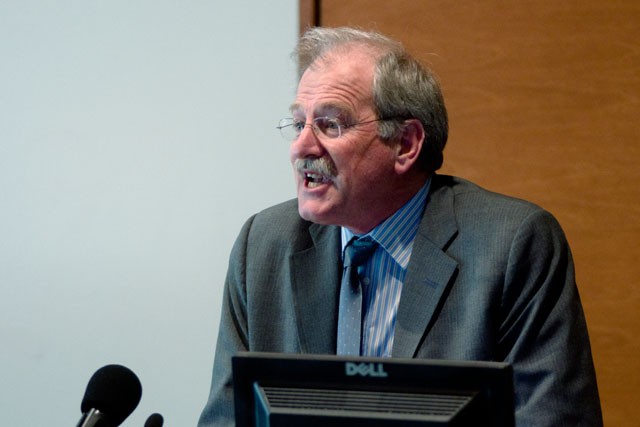With 29 countries facing severe food shortages and the global population expected to increase over the next 40 years, experts have set a timeline to not only secure the worldâÄôs food supply, but also to end hunger.
Limited resources, malnutrition and the toll of agriculture on the environment will continue to threaten the chances of reaching that goal.
âÄúWe want to produce more food, but there is less water, [and] we are facing climate change, which makes it much more difficult,âÄù Carlos Sere, director general of the International Livestock Research Institute, said on Monday at the University of Minnesota.
Leaders from two other internationally recognized agricultural research centers joined Sere to address the problems and solutions surrounding world hunger.
Shenggen Fan and Ruben Echeverria each lead organizations that are a part of a 15-member network called the Consultative Group on International Agricultural Research.
The experts spoke of the outlook of world hunger over the next 40 years, and the possibility of ending world hunger by 2050.
âÄú[The year] 2050 is when we will see the worldâÄôs population plateau, and it will change the game,âÄù Sere said. That means that by 2050, the world will have an additional 2 billion to 3 billion people to feed, which Sere called the âÄúhunger challenge.âÄù
This year, 29 countries have exhibited alarming levels of hunger. Fan, the director general for the International Food Policy Research Institute, said Africa has the biggest problem. Some Asian countries also been affected by serious food issues.
Over the next 40 years, food production will have to increase by 70 percent in order to meet the worldâÄôs demand, he said.
Ending world hunger is not something that the private sector or the public sector can do alone, Echeverria, director general of the International Center for Tropical Agriculture, said. âÄúThis is a good time to really work together seriously.âÄù
This is not the first time leaders have come together to try and solve the problem. In 1990, leaders of several international organizations set a common goal to cut hunger in half, âÄúbut instead of cutting hunger in half since 1990, hunger has increased,âÄù Fan said.
Paying more attention to smallholder farms or small-scale farming operations in developing countries could help.
âÄúSmallholder livestock systems are and will continue to be a mainstream of food systems,âÄù Sere said. âÄúThere [are] lots of hype around large-scale commercial productions, but the reality is [smallholders] are highly competitive âĦ the question is, âÄòHow do we link up with smallholders and make them more productive?âÄôâÄù
Experts agreed a good place to start is to carefully consider small farming areas in developing countries, start investing in them and find a way to do so in a timely manner.
âÄúWe canâÄôt do it one farmer by one farmer,âÄù Sere said.
Changing policy around food production is another factor that must be changed in order to end hunger by 2050, Fan said.
âÄúWe need a smarter, more innovative approach âĦ which means investing in two core pillars: agricultural and social protection,âÄù
he said.
Fan also said he wants to âÄúbring new players to the game,âÄù including emerging economies such as China and India. He said they need to be fully integrated in global food security agendas and help developing countries, he said.
But, Fan said, thereâÄôs a lack of involvement from those who are hungry.
âÄúWe need to involve poor people in the reform process,âÄù he said. âÄúWe should be supportive of the researchers in those countries and really try to promote a country-driven process.âÄù
In the area of policy research there is much more to be done, Echeverria said. All three of the experts agreed that research for the science and technology of agriculture cannot be left behind. Investing in agricultural research is ethically correct, Echeverria said.
âÄúItâÄôs also politically correct âÄî food security reduces political conflicts âÄî and economically correct because it produces high economic returns,âÄù he said.
Echeverria said he believes one of the most important things to be done in the fight against world hunger is to greatly increase advocacy.
âÄúWe have to do it, we have to have much more advocacy,âÄù he said. âÄúIâÄôm not saying go out and burn cars and throw rocks, but much more is needed.âÄù
In the end, all three experts agree that of all the things that need to be accomplished, the most important may be improving smallholder farms. âÄúSmallholders [are] the key,âÄù Fan said.
âÄúIâÄôm an optimist,âÄù Echeverria said, âÄúI think we [can achieve global food security] in 40 years âĦ we have the tools to do it.âÄù

Image by Jason Kopp
Dr. Carlos Sere speaks at the Sustainably Feeding the World panel discussion Monday at the Cargil Building on the St. Paul campus.
Experts tackle world hunger worries
Three agricultural experts spoke on a panel for securing the global food supply.
by Ashley Bray
Published October 19, 2010
0
More to Discover







